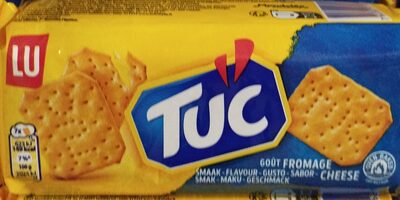
Barcode: 7622300571351
Flavour Cheese
DOUBTFUL
📝 Reason: This product contains ingredients requiring further verification. Their Halal status depends on undisclosed processing details and source materials that need clarification.
🏷️ Category: Snacks, Salty Snacks, Appetizers, Biscuits And Crackers, Meals, Crackers Appetizers
📄 Certificates: Green Dot, Fr:Triman
Ingredients:
Details
Understanding the Halal Status of Flavour Cheese
When it comes to selecting snacks, especially for Muslim consumers, understanding the Halal status of products is paramount. Flavour Cheese, while delicious, has a Halal designation that is categorized as ‘Doubtful’. This means that while many of its ingredients may typically be considered permissible, further details about processing and sourcing are necessary for a definitive answer.
Ingredients Breakdown
The ingredient list for Flavour Cheese includes:
- wheat flour
- palm fat
- barley malt extract
- glucose syrup
- salt
- eggs
- raising agents (ammonium hydrogen carbonate, sodium hydrogen carbonate)
- whey powder (from milk)
- flavour enhancers (E621, E631, E627)
- cheese powder 0.1%
- sunflower oil
- flour treatment agent (sodium metabisulphite)
- acidity regulators (citric acid, calcium lactate)
Let’s dive deeper into the Halal status of these ingredients.
Permissible Ingredients
Several ingredients are considered permissible in Islam:
- wheat flour: Has no restrictions in Islamic law.
- palm fat: A plant-based fat that is widely accepted.
- barley malt extract: Derived from barley and typically Halal.
- glucose syrup: Commonly used in food, Halal status is usually acceptable.
- salt: Universally permissible.
- eggs: If sourced from Halal practices, they are acceptable.
- whey powder (from milk): Should be Halal certified; milk generally is permissible.
- cheese powder 0.1%: Requires clarification on its origin.
- sunflower oil: Safe and Halal.
- flour treatment agent (sodium metabisulphite): Generally permissible.
- acidity regulators (citric acid, calcium lactate): Generally accepted as Halal.
Concerns Over E-Numbers
However, the inclusion of flavour enhancers adds a layer of complexity:
- E621 (Monosodium Glutamate): While often used to enhance flavors, its Halal status can vary depending on the source.
- E631 (Disodium Inosinate) and E627 (Disodium Guanylate): These flavor enhancers may originate from animal sources, which could affect their Halal certification. Thus, these require careful verification.
- Moreover, E327 (Calcium Lactate) is another ingredient needing attention as it might also impact the Halal classification.
The Importance of Source Verification
Since some of the ingredients in Flavour Cheese are derived from animal sources, it is crucial to verify whether these sources adhere to Halal practices. The ambiguity surrounding the processing details and origins of certain ingredients leads to its current ‘Doubtful’ status.
Certification Context
Flavour Cheese lacks a specific Halal certification, which makes it particularly complicated for consumers who prioritize Halal compliance. However, it does carry other certifications such as the Green Dot and Fr:Triman, indicating environmental compliance but not Halal verification.
Conclusion
In conclusion, while many ingredients in Flavour Cheese can be considered Halal, the presence of E-numbers, particularly flavour enhancers, introduces uncertainty. The verification of these ingredients and their sources is essential for determining the overall Halal status of this product. For those adhering strictly to Islamic dietary laws, it may be advisable to seek further confirmation or choose alternatives with clearer Halal certification.
